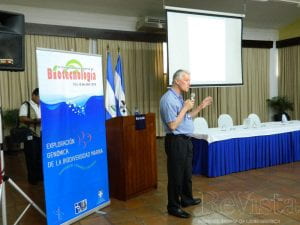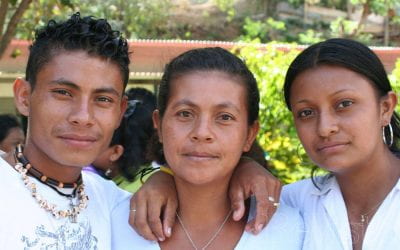Building Knowledge Economies in Central America
The Role of Universities

Nobel Laureate Richard J. Roberts of New England Biolabs at the opening ceremony of the VI Nicaraguan Biotechnology Conference (April 12-14, 2012) on Genomic Archiving and Coastal Marine Biodiversity Exploration, Conservation and Sustainable Development. Photo courtesy of Fernando Quezada.
Universities have become essential to how countries develop economically. They promote information and communication technologies (ICT), health sciences and medical instrumentation, new crop seeds and modern agriculture and sciences in general. In short, they are innovators, using their production and management of knowledge to produce what is known as a “knowledge economy.” This is particularly important in countries such as those of Central America, which have lagged behind.
University projects are playing active roles in the region’s knowledge economy takeoff. In El Salvador, the Universidad Don Bosco has an important initiative in the area of aircraft maintenance, involving multiple technology platforms. In Nicaragua, the Universidad Centroamericana has established the first Center for Molecular Biology in the country. The incubator Campus TEC in Guatemala is spearheading information and communications technology (ICT) with new applications software and other innovations. The National University in Honduras (UNAH) is supporting its university microbiology laboratories in leading-edge studies on HIV and dengue fever.
Governments throughout Central America are developing public policies to promote economic diversification and sustainable jobs through science and technology parks, innovation districts and “cluster” development. While the knowledge economy itself isn’t as large as the “traditional” economy, investors and government officials alike realize its growing importance and global dynamism. The question internationally is how to stimulate elements of the knowledge economy relating to fields such as biotechnology and renewable energy. Priorities include capacity-building in human resources, research infrastructure, legal framework for the protection of intellectual property and promotion of an innovation culture and climate. A key pillar of this new economic configuration is represented by the use and adaptation of ICT to facilitate the effective creation, dissemination, and processing of information. Although the international dialogue incorporates many associated terms and aspects such as “information society,” “new economy,” “digital economy,” “knowledge networks,” and “knowledge cities,” the themes of information revolution and innovation are paramount in all of the knowledge economy efforts. All of these concepts are associated with universities and their role in economic development.
While the least economically advanced countries of Central America, such as Honduras, Nicaragua, El Salvador and Guatemala remain noticeably behind in the development of knowledge-based sectors, efforts are underway to explore the various avenues and opportunities open to this region in the years to come. In addition to government programs and private industry initiatives, universities in the region have a major role to play in generating and sustaining the needed human capital and technology transfer pipeline. To be sure, intermediate and consumer products associated with the global knowledge economy are already part of governmental, business and civilian life there. Imported products of knowledge-based sectors in information and communications technology as well as in health sciences, agriculture, environmental engineering and others are all having an impact on how business is done in Central America. However, leading intellectuals and policy-makers in each of the Central American countries are called upon to establish programs and policies to help develop local capacity in creating and managing knowledge-based resources. Each country in the region has distinct public and private sector approaches to innovation. Each of these countries also exhibits a sizeable gap with the industrialized world in terms of standard of living as well as a widening disparity in local distribution of wealth. Unless regions like Central America can find ways to participate on the appropriate knowledge utilization, as well as on the production side of knowledge creation, the gap will only grow larger.
Paradigm Shift
The countries of Central America need to become less dependent on bulk exports of agricultural goods and minerals and other commodities. These countries do have manufacturing advantages based on low-cost labor and comparative wage differential, but they will be difficult to maintain against Asian competitors without introducing greater diversification and knowledge-based technological upgrading. Because knowledge-based companies are now more inclined to locate where the qualified and talented workers can be found, human capital development will need to be a high priority for all Central American countries.
Some countries in the region, like Costa Rica and Panama, are already moving forward to bridge gaps in human resource availability including outreach to their respective diasporas in the United States, Europe and other places. As part of its development agenda, Belize has launched a specific initiative to reengage with its diaspora. Scientists and engineers expatriates are valued not only for their contribution to the country’s economy in the form of remittances, but as an untapped stockpile of technology and expertise. Neighboring Honduras has created a public-private diaspora knowledge network for development called “Honduras Global.” In all of the countries, efforts to increase the educated workforce in these countries must be complemented with measures to absorb the knowledge workers. To thrive in the knowledge economy, the least developed Central American countries will need to build on their strengths and to identify the sectors and areas best suited for supporting knowledge-based economic activities. Based on current reported trends, these include information and communications technologies (including applications for small-and medium-sized businesses), logistics management, health percent life science, creative industries, biotechnology and sustainable agriculture. Strategies for transition must be developed, and needs support and synergy among the several countries.
Role of Universities
More and more, universities are seen as the generators behind efforts to build local and regional knowledge-based economic activities. In addition to their very central role in the education and training of qualified human resources, universities are at the center of technology commercialization efforts through newly established university technology transfer offices and expanding activity in university patenting. In developing countries, universities take on a more urgent role because of a relative lack of private sector initiatives in knowledge-based enterprises. In Brazil, for example, public and private universities are taking the lead in framing knowledge as a commodity which can be deliberately generated, stored, bought, sold and traded. Furthermore, universities provide the landmark for a changing paradigm that eliminates the strict division between mental and manual activities. Productive processes will continue to depend on university-based intellectual input and capacity-building in advanced skills. Yet, even the greatest universities with the utmost responsibility towards creativity and innovation cannot build the knowledge economy on their own. In their leadership roles, however, as they bring about the development of a culture of learning and commitment to innovation and entrepreneurship, universities can make substantial contributions to local and regional economies.
While universities in Central America are striving to provide top education and training programs to a growing population of young professionals, there continues to be a lack of corresponding employment opportunities, quality standards, international linkages and R&D infrastructure commensurate with the technological and scientific knowledge and skills attained abroad. Similarly, the flow of Central American students going abroad for advanced training in science and technology is not always matched with a return flow of these highly qualified human resources to the region because of a lack of employment opportunities. It is perhaps this lack of employment in knowledge-based industries in these Central American countries that explains the reported decrease in demand for science degrees in the region. The online journal SciDev.Net reports that just three percent of secondary students in Latin America express their interest in pursuing a career in science. This statistic may not entirely reflect the situation in Central America, but points to the need to maintain student interest in the emerging fields of science and technology and related careers. Universities in El Salvador, Guatemala, Honduras and Nicaragua also have much work ahead in improving their standing in international rankings.
Universities in Central America also can help solve many obstacles arising from frequently difficult circumstances of both human resources and financial allocations. The question that arises is whether they are able to compete with the best universities in the world and ensure a sustainable level of excellence while becoming more effective in responding to societal and economic needs.
Regional Study
In their attempt to position themselves effectively in the global economy, Central American countries have benefited from the cooperation of international development agencies. The Deutsche Gesellschaft für Internationale Zusammenarbeit (GIZ) GmbH (German Agency for International Cooperation) implements various programs in Central America on behalf of the German Federal Ministry for Economic Cooperation and Development (BMZ) that work in collaboration with government institutions, universities, private sector organizations and community groups on issues such as sustainable economic development, renewable energies and prevention of youth violence. In 2011, GIZ launched a regional project called “Knowledge Economy in Central America,” which seeks to stimulate discussion on the conditions and actions required to enable a successful transition toward national and regional economies based on knowledge. The study project, which focuses on El Salvador, Guatemala, Honduras and Nicaragua, is designed to create a greater awareness on the part of the public, private and academic sector, about opportunities in knowledge-based economic activities as well as to present existing example cases and practical recommendations to key decision makers on this topic. Universities and university-related institutions in the above mentioned countries are playing an important part in this study.
As knowledge becomes a key element of the Central American countries’ economies, universities have real opportunities to play a leading role in the local innovation systems. Yet universities also face critical challenges in seeking to rise to the changing economic and social environment. These difficulties should be borne in mind when considering policy frameworks that might be developed to foster knowledge-based economic development. The GIZ study will lay out a number of projects and strategies that are actively contributing to regional economic development. The success of such examples makes a case in favor of an even more significant university role in building knowledge economies in Central America.
Fall 2012, Volume XII, Number 1
The authors of the present article serve as coordinators of the GIZ study project that also involves country experts in each of the four countries mentioned.
Jorge A. Huete-Pérez is Director of the Molecular Biology Center at Universidad Centroamericana, Managua, Nicaragua, www.uca.edu.ni
Peter Sommer is Advisor on Sustainable Economic Development at Deutsche Gesellschaft für Internationale Zusammenarbeit (GIZ) GmbH, San Salvador, El Salvador, www.giz.de
Fernando Quezada is Executive Director, Biotechnology Center of Excellence Corporation, Waltham, Massachusetts, www.BioAmericas.org
Related Articles
University Lessons: Editor’s Letter
I learned about universities on the barricades. Well, not exactly. I was a philosophy student at Barnard—the women’s college at Columbia University—when the uprising began in 1968. Students, including my boyfriend and several classmates, took over buildings to protest…
The Last Word
More than twice as many Latin Americans are attending institutions of higher education than two decades ago, and the number will continue to increase as more students graduate from secondary schools. ReVista’s timely focus on higher education is thought-provoking…
Making a Difference: A Problem With the UN Millennium Goals
Every Saturday for two years, Estevana Sánchez walked through the jungle for miles, in the dark, crossing a river in the rainy season, to finish high school. Her five teenage children did the same. At the end of the trail, they took a long bus ride to the town of San Juan del Sur…




